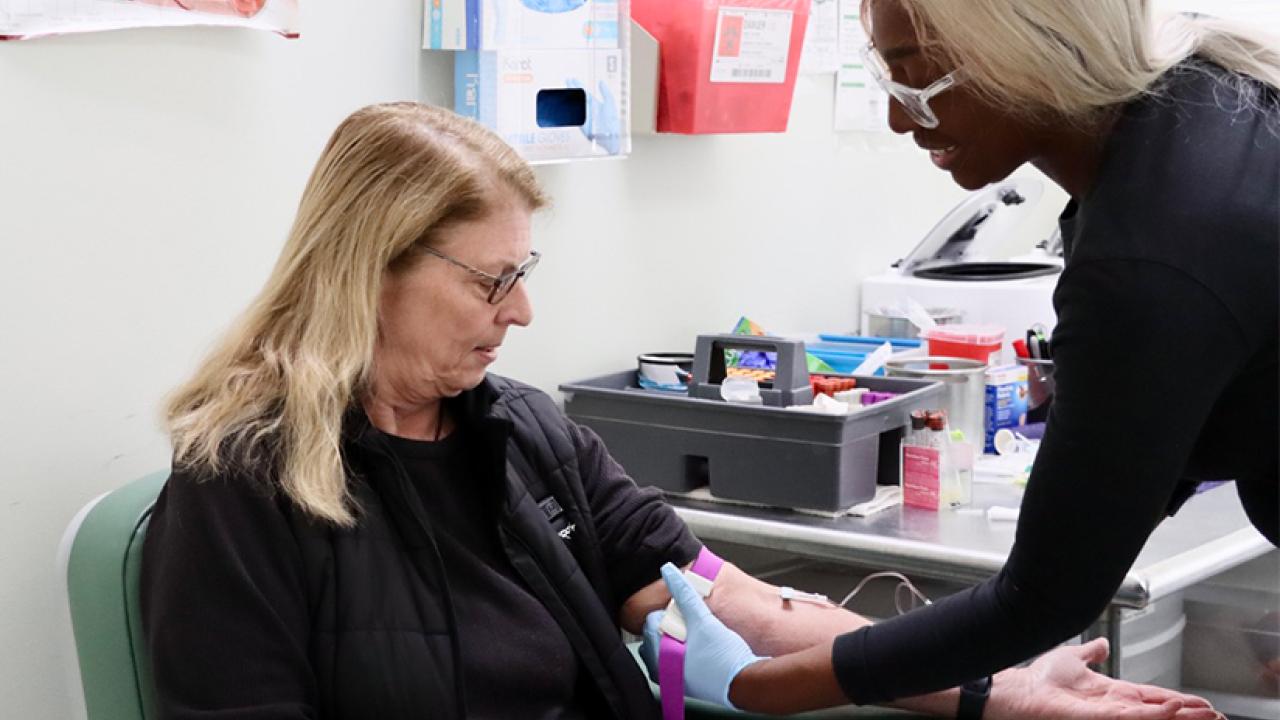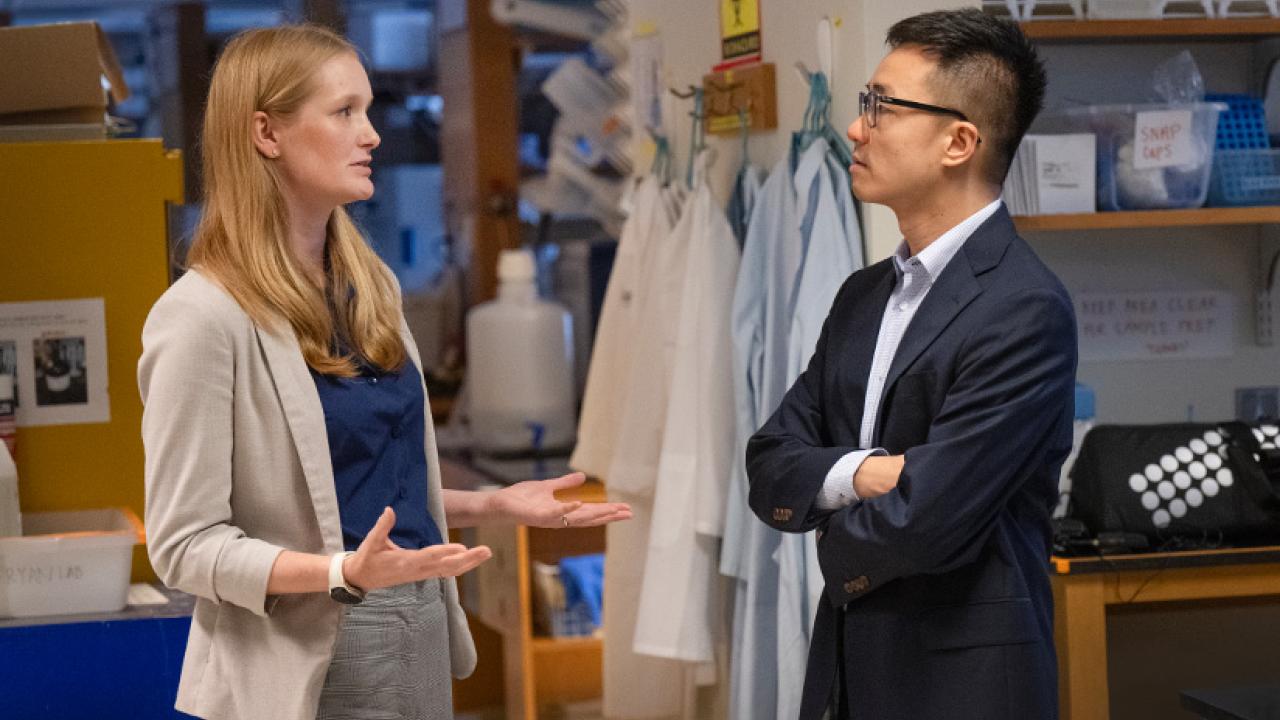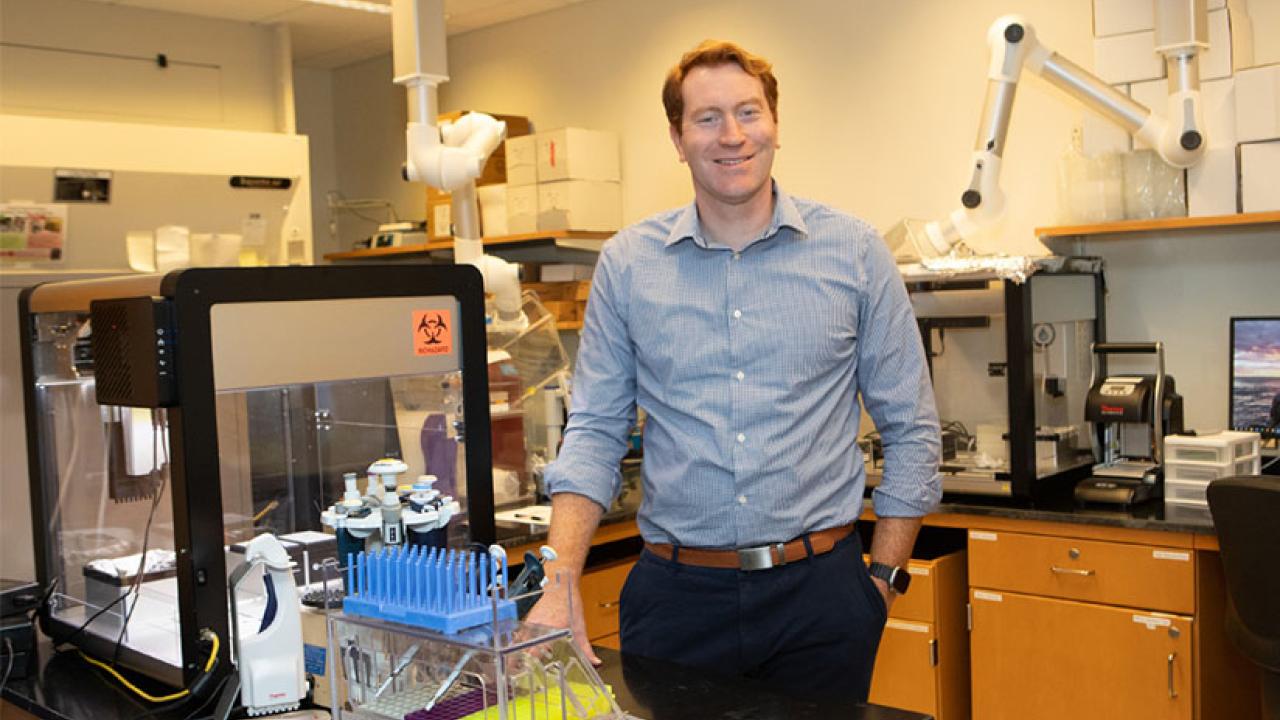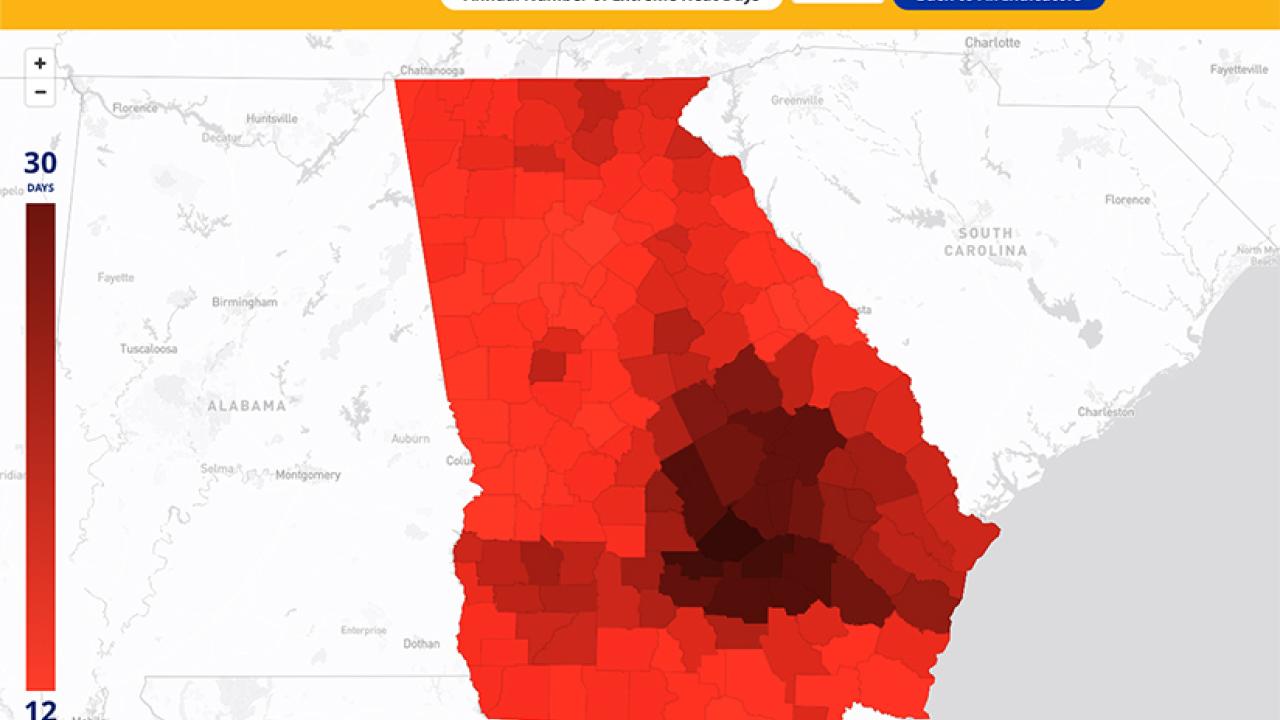Environmental Health Research & Practice

On This Page
Research Overview
Gangarosa Department of Environmental Health experts are on a quest to understand our greatest public health concerns: the environment and its impacts on well-being worldwide. Our research is designed to find solutions, impact policy, and make a difference for the benefit of all.
Our Research Topics and Types
The Gangarosa Department of Environmental Health joins faculty and students invested in the environment and human health to conduct interdisciplinary research, share results, and impact policy as they work to make a tangible difference.
Research Topics
- Air pollution
- Chronic diseases
- Emerging chemical exposures
- Environmental epidemiology
- Environmental justice and social determinants
- Exposure science
- Health impacts of climate change
- Infectious disease and anti-microbial resistance
- Intervention, policy, and community engagement
- Maternal and child health
- Omics, exposomics, and data science
- Toxicology and biomarkers
- Water, sanitation and hygiene
Research Types
- Air pollution modeling
- Causal inference
- Environmental mixture analysis
- Exposure assessment
- Exposomics profiling
- Machine learning
- Panel studies
- Prospective cohort studies
- Single and multi-omics technologies
- Survival analysis
Research Spotlight
GDEH Research Making an Impact

Rollins Researchers Respond to Community PFAS Concerns in Northwest Georgia
Responding to concerns of residents in the northwest Georgia communities of Rome and Calhoun, researchers from Emory University's Rollins School of Public Health are analyzing blood samples from approximately 200 residents to determine their level of exposure to PFAS, or "forever chemicals."

Emory Researchers Launch Investigation into Why Air Pollution Impacts Alzheimer’s Disease Risk
Researchers from Emory University recently received two separate grants, totaling $15 million, from the National Institutes of Health (NIH) to lead a first-of-its-kind, multifaceted study into why specific types of air pollution increase the risk of Alzheimer’s disease and related dementias.

Rollins Researchers Part of $39.5M Effort to Revolutionize Drug Efficacy, Safety
A newly announced research effort aims to make medications safer and more effective, by studying the environmental, genetic, and lifestyle factors that contribute to both drug efficacy and negative drug interactions.

Study Links Structural Racism to Increased Exposure to Cancer-Causing Air Pollution
People living in neighborhoods with higher levels of structural racism are at a significantly greater risk of exposure to traffic-related air pollutants than those in neighborhoods with low structural racism, researchers at Emory University's Rollins School of Public Health found in a new study published in Cancer.

Health Impact of Climate Change Across Georgia Detailed by New Emory Dashboard
The Rollins School of Public Health at Emory University has launched a new climate and health indicator dashboard that provides data on the impact that climate change is having on human health in Georgia.
Focus Areas
Our Areas of Expertise
Our faculty’s wide-ranging expertise is reflected in teaching and research that ranges from the molecular to the global, from toxicology and exposure science to exposomics and climate change. Faculty and students examine environmental media and health effects associated with chemical, physical, nutritional, and microbial exposures and do so in partnership with local non-profits, governmental agencies, and multi-national research projects.
Air pollution is the single largest global environmental health risk factor, contributing to disease and mortality worldwide.
In the U.S., environmental protection measures like emission control regulations and mitigation technologies have led to substantial reductions in ambient pollutant levels since the 1970s. Policy-relevant research assessing exposure to pollution and its associations with illness has fueled progress.
Despite advances, roughly 75 million people live in counties where pollution levels remain above U.S. Environmental Protection Agency standards. In many other parts of the world, pollution levels soar above levels considered safe for the population.
Domestically and globally, concerns persist about emissions from industry, vehicles, environmental tobacco smoke, and burning solid fuels like coal, wood, and dung for cooking and home heating. These practices are prevalent in developing countries.
Air pollution and climate change are inherently interlinked. In this complex system, air pollution drives and limits global warming. It’s necessary to anticipate increases in natural threats like wildfires and ozone pollution as our climate warms; concerns about public health, now and in the future, keep rising.
Rollins faculty and students lead projects that investigate and address concerns about air pollution and human health. The Southeastern Center for Air Pollution and Epidemiology, a research collaboration between the Gangarosa Department of Environmental Health, the Department of Epidemiology, the Department of Biostatistics and Bioinformatics, and the Georgia Institute of Technology, bridges much of this work.
Examples of departmental research on air pollution and health:
- Studying links between exposures to pollution mixtures that occur during automobile commuting and corresponding acute cardiorespiratory injury
- Investigating ambient air pollution mixtures and whether women’s exposure during pregnancy is associated with risks of preterm delivery and reduced birth weight
- Characterizing traffic pollution and metabolomic response in cohorts of people exposed to near-road emissions
- Quantifying how emission programs and meteorological variations impact air quality and human health
- Estimating associations between ambient air pollution mixtures and emergency department visits and hospital admissions for cardiovascular and respiratory patients in the U.S.
- Examining exposure to air pollution mixtures during the first year of life and its association with the incidence of childhood asthma
- Studying the effects of replacing polluting biomass cookstoves with cleaner alternatives in low- and middle-income countries and the corresponding health benefits in mothers and their newborn infants
Climate change is one of humanity’s greatest challenges. From heat waves and droughts to changes in food supply, infectious disease dynamics, and air quality, climate change’s influences will affect people worldwide for decades to come.
We know reducing carbon emissions can improve public health. Developing and implementing new climate policies can improve air quality, our diets, and transportation safety.
Climate@Emory, an Emory University campus-wide initiative, connects students and faculty from six schools and more than 20 departments in an effort to advance research, teaching, and community outreach to understand and address climate change.
At Rollins, we’re building connections—within the Atlanta community and with partners around the world—to help us attain a deeper quantitative understanding of global climate change and its public health consequences. Since it is impossible to understand climate change from the standpoint of any one discipline, Gangarosa Department of Environmental Health students with transdisciplinary training can play a key role in translating research into policy and practice.
Emory University is an accredited, official observer of the United Nations climate talks of the Conference of the Parties to the United Nations Framework Convention on Climate Change. This accreditation allows Emory faculty, staff, and students to participate in annual negotiation sessions attended by thousands of non-governmental observers each year. Emory representatives present research, network, teach, and learn at the conference that produced historic international agreements in Kyoto in 1997 and Copenhagen in 2009.
The Gangarosa Department of Environmental Health is a national standout in training future climate change leaders. Emory faculty lead high-impact research on climate science and impacts, strategies for greenhouse gas emissions reduction, and approaches for increasing climate resilience. Students interested in focusing on the intersection of environment and wellness can specialize their master's degree by completing a Certificate in Climate and Health.
Examples of departmental research on global climate change and health:
- Estimating climate change’s impact on China's efforts to reduce diarrheal and vector-borne diseases
- Multi-location epidemiological studies of heat-related morbidity and mortality, including sensitive and vulnerable group assessments
- Projecting future health burdens and economic costs associated with increased wildfires in the western United States
- Conducting an assessment of heat-related morbidity among sensitive populations in the Atlanta metropolitan region and estimating how future climate change may affect local demand for emergency medical care
- Investigating how the air pollution-related health “co-benefits” of climate policy should affect when, where, and how much to mitigate
Emerging chemical exposures are a critical area of focus in environmental health research. Advances in technology and industrial processes continue to introduce new chemical compounds into the environment, raising concerns about their potential impacts on human health. These emerging chemicals include industrial chemicals, pharmaceuticals, personal care products, pesticides, and flame retardants, among others.
Understanding the sources, pathways, and effects of emerging chemical exposures is essential for assessing their potential risks to human health and developing strategies to mitigate these risks effectively. Rapid industrialization, globalization, and urbanization have led to increased production and use of chemicals in various sectors, resulting in widespread environmental contamination and human exposure. Many emerging chemicals have been detected in air, water, soil, food, consumer products, and biological samples, highlighting the need for comprehensive monitoring and surveillance efforts to track their presence and trends over time.
Research on emerging chemical exposures employs a combination of analytical chemistry techniques, toxicological studies, exposure assessment methods, and epidemiological investigations to characterize the hazards associated with these chemicals and their potential health effects. By evaluating exposure levels, toxicity profiles, and mechanisms of action, scientists can identify priority chemicals of concern and prioritize interventions to reduce exposure and protect public health.
Interdisciplinary collaborations between scientists, policymakers, industry stakeholders, and community representatives are essential for advancing research on emerging chemical exposures and translating scientific findings into actionable policies and interventions. Proactive measures, such as chemical screening, risk assessment, green chemistry initiatives, and pollution prevention strategies, can help mitigate the adverse effects of emerging chemicals on human health and the environment, promoting sustainable development and fostering healthier communities for future generations.
Environmental epidemiology is the study of the environmental determinants of disease. Exposures are usually mostly the same across the general population, with only small differences, which can make it difficult to identify exposure-response trends. Biomarkers of exposure are useful, but many environmental toxins have short half-lives and are difficult to measure in biomarkers. Nonetheless, we know that large populations are exposed to low level toxins, many of which are chemicals relatively recently introduced into the environment, whose potential toxicity is not known. The challenges, along with the political and economic context of studying and regulating toxic chemical exposures, create a dynamic field where researchers constantly innovate their approaches.
Environmental factors that impact infectious diseases are also a major area of research within environmental epidemiology. As climate change expands insect habitats, vectors of infectious disease (like mosquitos, who are vectors for malaria, Zika virus, and more) are likely to become more widespread. Poor water quality and sanitation continue to affect large parts of the world, particularly affecting children, and also contribute to high rates of infectious disease. Environmental epidemiologists develop methods to measure risk factors for infectious disease and markers of early infection.
Techniques used in environmental epidemiology include:
- Observational studies
- Mixture analysis
- Mediation analysis
- Machine learning techniques
- Regression models
- Quantitative bias analysis
Exposure science is a critical field at the intersection of environmental health and public safety, focusing on understanding how humans come into contact with various chemical, biological, and physical agents in their environment. It investigates the pathways and mechanisms through which individuals are exposed to potentially harmful substances, ranging from air pollutants and toxic chemicals to microbial pathogens and radiation.
By examining the routes, intensities, durations, and frequencies of exposure, exposure scientists strive to assess the risks posed to human health and develop strategies to mitigate these risks effectively. This multidisciplinary approach integrates elements of environmental science, toxicology, epidemiology, engineering, and risk assessment to comprehensively evaluate the complex interactions between humans and their environment.
Exposure science uses various methods and tools to measure and analyze exposure levels, including:
- Environmental monitoring to collect and analyze air, water, soil, and food samples to quantify the concentrations of contaminants present in the environment
- Biomonitoring to measure the levels of chemicals or their metabolites in human tissues or biological fluids to assess internal exposure
- Computational modeling to simulate exposure scenarios and predict potential health effects
The insights gained from exposure science are instrumental in informing public health policies, regulatory decisions, and risk management strategies to protect populations from environmental hazards. By identifying vulnerable populations, understanding disparities in exposure, and evaluating the effectiveness of intervention measures, exposure science plays a crucial role in promoting environmental justice and ensuring equitable health outcomes for all communities.
Global environmental change is increasingly affecting the pathways of infectious diseases. New epidemics of cholera and other illnesses arise in the wake of natural disasters. Vector-borne diseases such as West Nile virus and chikungunya spread to new territories. Questions about environmental conditions and their effects on the worldwide movement of COVID-19 continue.
These are just a few examples of environmental factors playing roles in the spread of emerging infectious diseases, the majority of which are of animal origin.
As the environmental health field’s scope expands to encompass exposures to infectious diseases in addition to traditional toxicological agents, it brings exciting developments to the field. Emory researchers are at the forefront, engaging in cutting-edge work on topics related to water- and vector-borne diseases, antibiotic resistance, the gut microbiome, and OneHealth. Students have opportunities to engage in many projects related to infectious disease interactions, exposures, and outcomes.
Examples of departmental research on infectious disease ecology:
- Studying environmental pathways of chicken-sourced enteropathogens in Mozambique and the impact of an improved water supply on enteropathogen infection, gut microbiome, enteric dysfunction, diarrhea, and growth faltering in children
- Examining impacts of early arsenic exposure on infectious disease outcomes in Bangladeshi children
- Tracking pathogenic E. coli, gut microbiome composition, and human movement patterns along a rural-urban gradient in Ecuador
- Evaluating the interaction between infectious disease transmission and agricultural practices in the Senegal River Basin
- Understanding pathogen introduction and threats to endangered primates
- Looking at the urban ecology of vector-borne diseases
Intervention, policy, and community engagement strategies form a comprehensive framework for advancing environmental health research and promoting sustainable development. By integrating scientific knowledge, policy advocacy, and community empowerment, we create healthier and more resilient communities for present and future generations.
Our research seeks to impact environmental health policy by developing rigorous evidence regarding a wide range of environmental factors affecting human and planetary health. We explore the equity of environmental policies and their differential impacts on underrepresented populations. We also emphasize effective dissemination of research, not only in peer-reviewed journals and at international conferences but also through innovative channels using policy partners and social media.
Our teaching familiarizes students with core U.S. and state environmental and occupational health laws and administrative agencies, as well as corresponding international commitments of the United Nations and other organizations. Developing policy analysis skills, including mapping of stakeholders and interests, helps learners identify opportunities to realign objectives and build consensus. Lessons in essential tools like negotiation, cooperation, and compromise also equip students to achieve progress.
Examples of departmental research in environmental health policy:
- Working with the World Health Organization to develop the evidence base for its Guidelines on Sanitation and Health and to write a guidance document on methods for evaluating household energy interventions
- Providing technical assistance to the governments of Vietnam, Ghana, Kenya, and Vietnam to develop standards and strategic plans for household water treatment
- Advocating for greater integration of core environmental health interventions in water and sanitation, air pollution, and vector control
- Translating research into Lancet medical journal commentaries on gender priorities in environmental health
Environmental health has experienced an exponentially expanding scope over the last two decades, in large part due to omics. Omics technologies are used to quantify and study thousands or even millions of molecules simultaneously, providing comprehensive insights into biological processes and their interactions with environmental factors and health outcomes.
Integrating omics into environmental health sciences has many advantages:
- Holistic understanding: Genomics, epigenomics, transcriptomics, proteomics, metabolomics, lipidomics, and microbiomics allow researchers to study biological systems comprehensively. They give insights into how these systems respond to our environment at multiple molecular levels.
- Exposomics research: Exposomics is a rapidly growing field of research that aims to comprehensively characterize an individual’s exposome (all of the things they are exposed to over the course of their life) to identify the environmental factors that contribute to the development of disease.
- Identification of biomarkers: Omics data can help identify novel molecular biomarkers that characterize exposure to environmental contaminants and predict associated health effects.
- Toxicity mechanisms: Understanding how pollutants disrupt biological processes and cause health issues can help researchers identify molecular targets for intervention.
- Personalized risk assessment: By analyzing an individual's genetic makeup and other omics data, researchers can conduct personalized risk assessments for susceptibility to environmental hazards, allowing for more targeted interventions and policies.
- Environmental monitoring: Omics-based tools can be used for environmental monitoring, helping detect the presence of disease-causing agents and assess their potential impact on ecosystems and public health.
- Data integration: Integrating omics data with environmental, epidemiological, toxicological, and clinical data uses data science approaches to appropriately manage big data and perform advanced statistical approaches.
The Gangarosa Department of Environmental Health has numerous faculty that are engaged in omics, exposomics, and data science research projects, as well as access to broader infrastructure to perform this research. Students can engage with these resources by working with faculty advisors, enrolling in associated certificate programs, or engaging with research at centers like HERCULES Exposome Research Center.
Adverse health outcomes after environmental exposures arise from interactions between chemical toxicants and exposed organisms. A major focus of the Gangarosa Department of Environmental Health is to understand the mechanisms responsible for those toxic effects.
This relies on multidisciplinary research approaches, including:
- Experimental molecular toxicology
- Genome-scale analyses using omics platforms and systems biology
- Development and application of biomarkers of exposure, susceptibility, and effect
- Data science and computational modeling
As basic biological sciences advance, innovative experimental tools are increasingly used to investigate biological systems exposed to a myriad of environmental toxicants. Technological revolutions in genomics, epigenomics, transcriptomics, proteomics, metabolomics, and mass spectrometry have transformed biological research. These technologies now provide insights into how animal and human bodies experience environmental exposures. Revealing toxicological responses and their underlying molecular pathways and mechanisms requires integrating experimental and computational approaches. Our faculty collaborates to drive that integration.
Critically evaluating environmental contributions to health and disease from a multidisciplinary perspective is imperative to successful research and health risk assessment. Our research and classroom training draws upon faculty expertise in epidemiology, exposure science, data science, and biological mechanisms of disease. This transdisciplinary approach enables us to impart students with a holistic understanding of chemical toxicants’ influence on human health.
Examples of departmental research on toxicology and biological determinants of disease:
- Using computational modeling of adverse outcome (toxicity) pathways to determine the shape of dose-response relationships
- Bridging the data gap from in vitro toxicity testing to human risk assessment through computational approaches
- Identifying and assessing the effect of environmental toxicants on neurological development and function
- Performing genome-scale analyses of molecular features in human populations to identify how exposures impact cellular function and relate to health and disease
- Incorporating high-resolution metabolomics into investigations on the molecular mechanisms and disease etiology associated with air pollution or persistent organic pollutant exposures
- Applying refined measurements of clinical biomarkers indicative of chemical exposures, individual or population susceptibility, and intermediate and terminal clinical effects in extensive population-based epidemiologic studies
- Assessing the impact of the early-life environment on genetic and epigenetic regulation
Basic sanitation facilities, clean water supplies, and hygienic behaviors are the foundations of public health, but hundreds of millions of people lack basic access. Those deficiencies are often responsible for diarrheal diseases (one of the leading causes of under-five mortality in the world), acute respiratory infections, soil-transmitted helminth infections, trachoma, schistosomiasis, and poor growth and nutrition. WASH insecurity disproportionately impacts the urban and rural poor, especially women and girls.
Emory is a global leader in the field of WASH. The Rollins School of Public Health is the home of the Center for Global Safe WASH, founded in 2004 through the support of Dr. Eugene J. and Rose Gangarosa. Faculty at the Gangarosa Department of Environmental Health have substantial expertise in the transmission pathways of water- and soil-borne pathogens and have developed and evaluated interventions to improve WASH conditions.
Emory is also a founding member of the Atlanta Consortium for Safe Water, Sanitation and Hygiene, a group of academic, non-profit, and government partners with a history of collaboration on major projects and WASH research.
Our students have opportunities to pursue WASH-related research and practicum projects outside the classroom, working with faculty and partner organizations to implement, maintain, and evaluate WASH-related programs in both domestic and international contexts. They can apply skills from a variety of public health disciplines, including infectious disease and spatial epidemiology, implementation science, risk assessment, behavioral science, quantitative and qualitative methods, impact evaluation, and microbiology.
Emory is the only School of Public Health to offer a Certificate in WASH, a rigorous, self-guided program aiming to increase the competitiveness of Rollins students pursuing WASH-related careers.
Examples of departmental research on WASH:
- Measuring the impact of WASH in Schools in the Lao People’s Democratic Republic
- Assessing the health impact of water filters and improved cookstoves on diarrhea in Western Province, Rwanda
- Examining the climate drivers of diarrheal diseases in Ecuador and China Evaluating salmonella in produce irrigation source water in Southern Georgia
- Evaluating salmonella in produce irrigation source water in Southern Georgia
Centers & Labs
Specialized Research Centers
Join Us
Ready for Your Next Step?
Whether you already know you want to pursue research at Rollins or want to learn more about admissions and costs, we’re here to help.
.jpg?crop=yes&k=c&w=1920&h=1440&itok=4NdnZTvX)


